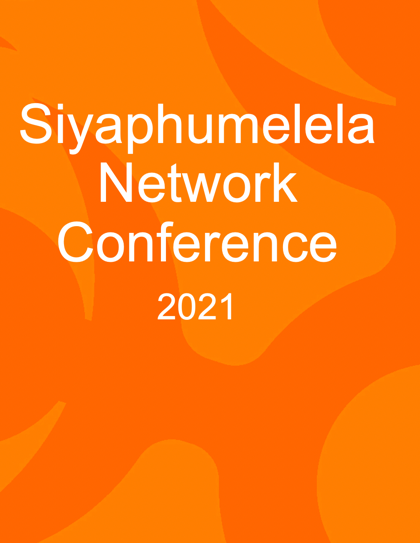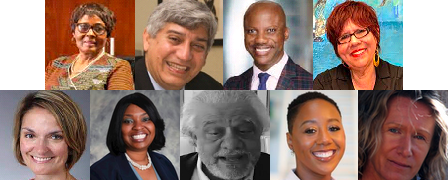
Siyaphumelela Conference: Rave Reviews
Ephraim Mahlanga
“An extremely insightful conference which highlighted the importance of the student voice and the need to know and understand our students, to equip us to provide better and sufficient support. The passion and enthusiasm from all the attendees, presenters, keynote speakers and organisers were visible even in an online set-up”.
“The variety of voices - the local and international mix of keynote speakers provided a platform to share their stories”.
These responses characterise many delegates’ reactions to, the 2021 Siyaphumelela conference - a platform for sharing ideas and the rich experience of promising interventions that support student success in higher education. In their reflection and feedback, the 88 delegates that responded to the conference evaluation, expressed their positive appreciation of the overall conference experience. An overwhelming 98% of delegates said that they found attending the 2021 Siyaphumelela conference, really worthwhile.
Facilitated by Saide, and informed by the work of local and international innovators working in the field of student success in higher education, the Siyaphumelela network of 14 universities work collaboratively, sharing and nurturing models of student support that are suited to the South African context. The annual Siyaphumelela conference provides a wonderful opportunity to showcase such interventions. This year, the number of conference participants and the number of good practice examples shared, was greater than ever before.
To continue improving the quality of the Siyaphumelela conferences, the Saide project team solicits feedback from participants in the form of an online evaluation survey. The following reflection on the evaluation results serves to highlight some of the innovative student support practices that have been implemented across the various Siyaphumelela Network institutions.
This year, 75% of the respondents indicated that they attended the conference for the first time, clearly signally that holding a virtual conference, was in no way a deterrent, in fact quite the opposite. Attendance by 240 delegates constitutes the highest conference participation rate to date. Reasons provided by respondents suggest that the lower costs involved in participating in a virtual conference (no travel and hotel accommodation costs) were key factors resulting in this year’s high participation rates. The virtual nature of the conference also enabled a large number of international key note speakers to present.
The virtual conference is a bit more accessible, and it is easier to hear what other institutions are doing nationally and internationally.
I like involvement of institutions/participants from abroad in the virtual conference.
It is gratifying to note that 97% of the respondents acknowledged that the virtual conference was well organised. Delegates also found that the virtual format of the conference provided them with flexibility regarding choice of sessions. They also reflected on the user friendliness of the programme and ease of navigation.
I liked the flexibility to move from one concurrent session to another.
The breakout sessions were generally very well organised and the programme chairs were good at keeping things rolling along on time.
How easy it was to navigate online- the programme was excellent!!
It was thoroughly planned and the sessions were highly informative.
The currency of themes and issues presented made this conference very relevant to practitioners in the field of higher education. The majority, 83% of respondents indicated that the four themes selected, were of keen interest to them. These were:
- Leadership and innovation in equitable, holistic student success interventions.
- The role of students in shaping student success.
- Contemporary learning design for today’s students.
- Authentic approaches to evaluation.

Nine keynote speakers, all highly prominent thought leaders in the field of student support participated in this year’s conference. Two were local and their presentations addressed the South African context. Four of the key notes speakers were from the United States of America and one from the United Kingdom, thus providing an international perspective. Prof Nthabiseng Ogude from the University of Pretoria (UP) presented findings related to one of UP’s flagship student success projects, which focuses on the importance of forging a strong link between basic and higher education to promote student success. Prof. Ahmed Bawa, CEO of Universities South Africa focused in his keynote on the importance of designing systems for student success in higher education. Two of the American keynotes focussed on broad aspects of social justice, Prof. Shaun Harper (University of Southern California Race and Equity Centre) addressed the issue of Black undergraduate student success at university. Prof. Laura Rendon (University of Texas- San Antonio) an education theorist, activist and researcher who specialises in college preparation, persistence and graduation of low-income, first-generation students, focused her presentation on the importance of designing a pedagogic framework for wholeness, equity and social justice. While Dr Laurie Fadd (Director, Holistic Student Support, Achieving the Dream, US) and Bonita Brown (Vice President, Northern Kentucky University) addressed the importance of incorporating student voices into the design of student support interventions. Paul LeMahieu (Senior Vice President, Carnegie Foundation- Stanford US) and Patrice Dawkins-Jackson (also of the Carnegie Foundation) presented on the value of networked improvement communities. The final keynote was presented by Helen Beethham (Researcher, University of Wolverhampton, UK) who presented on the digital capabilities that students need to succeed. All the keynote presentations elicited very positive responses in the conference evaluation feedback. Delegates also commented very positively on the parallel presentations. Comments included:
All of the keynote speakers were excellent.
Good quality presentations, relevant to challenges we experience and the culture of sharing amongst institutions.
Student voices coming through in the presentations.
I liked the range of relevant presentations, and the passion and learnings from the different universities and presenters.
I liked the range of knowledge areas, not only for keynotes, but also for parallel presentations. No individual focus area dominated the conference and it provided a balanced and stimulating environment.
The presentations were awesome and inspirational, and keynote addresses were inspiring.
The richness and relevance of presentations and the generous sharing of ideas and experiences of academic staff committed to the project of in student success in higher education institutions across South Africa as well as internationally, resulted in the positive reviews of the 2021 Siyaphumelela conference. The overwhelming number of respondents, 98%, said that they found attending the conference worthwhile and would recommend future Siyaphumelela conferences to their colleagues.
In conclusion, the delegates felt that the conference serves as a catalyst for scaling up the Siyaphumelela student success initiative activities, thus serving to enhance the collective impact needed to transform the South Africa higher education system for the better.

